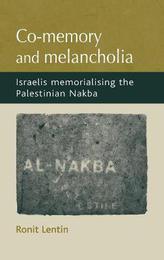
|
Co-Memory and Melancholia: Israelis Memorialising the Palestinian Nakba
Hardback
Main Details
| Title |
Co-Memory and Melancholia: Israelis Memorialising the Palestinian Nakba
|
| Authors and Contributors |
By (author) Ronit Lentin
|
| Physical Properties |
| Format:Hardback | | Pages:208 | | Dimensions(mm): Height 234,Width 156 |
|
| ISBN/Barcode |
9780719081705
|
| Classifications | Dewey:956.9405 |
|---|
| Audience | | Tertiary Education (US: College) | | Professional & Vocational | |
|---|
|
Publishing Details |
| Publisher |
Manchester University Press
|
| Imprint |
Manchester University Press
|
| Publication Date |
31 August 2010 |
| Publication Country |
United Kingdom
|
Description
The 1948 war that led to the creation of the State of Israel also resulted in the destruction of Palestinian society when some 80 per cent of the Palestinians who lived in the major part of Palestine upon which Israel was established became refugees. Israelis call the 1948 war their 'War of Independence' and the Palestinians their 'Nakba', or catastrophe. After many years of Nakba denial, land appropriation, political discrimination against the Palestinians within Israel and the denial of rights to Palestinian refugees, in recent years the Nakba is beginning to penetrate Israeli public discourse. This book explores the construction of collective memory in Israeli society, where the memory of the trauma of the Holocaust and of Israel's war dead competes with the memory claims of the dispossessed Palestinians. Taking an auto-ethnographic approach, Ronit Lentin makes a contribution to social memory studies through a critical evaluation of the co-memoration of the Palestinian Nakba by Israeli Jews. Against a background of the Israeli resistance movement, Lentin's central argument is that co-memorating the Nakba by Israeli Jews is motivated by an unresolved melancholia about the disappearance of Palestine and the dispossession of the Palestinians, a melancholia that shifts mourning from the lost object to the grieving subject. Lentin theorises Nakba co-memory as a politics of resistance, counterpoising co-memorative practices by internally displaced Israeli Palestinians with Israeli Jewish discourses of the Palestinian right of return, and questions whether return narratives by Israeli Jews, courageous as they may seem, are ultimately about Israeli Jewish self-healing rather than justice for Palestine. -- .
Author Biography
Lecturer in Sociology and Director of the MPhil in Race, Ethnicity, Conflict at the department of Sociology, Trinity College Dublin. -- .
|